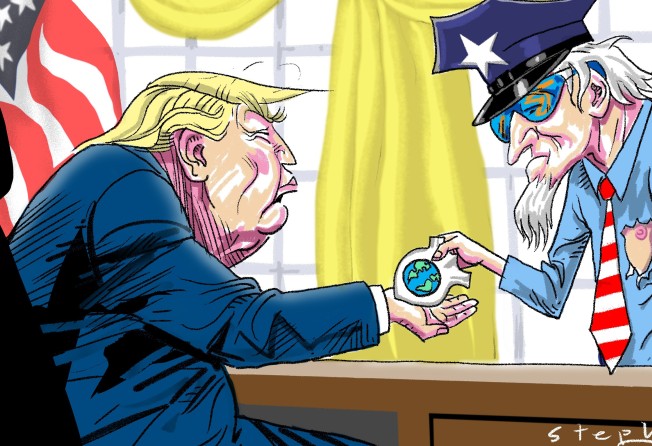Trump’s giveaways to North Korea are a sign of the US’ diminishing presence on the world stage
Douglas H. Paal says in the eagerness to make a deal and woo American voters, Trump has further chipped away at the US’ global standing and undermined national security

With the conclusion of the Trump-Kim summit in Singapore, most rational observers note that the spectre of unnecessary conflict that haunted 2017 has been replaced by a peaceful process to deal with the North Korean nuclear threat that may take years to unfold. That is the good news. The bad news is that Donald Trump has also signalled his intention to preside over America’s retreat from its post-war role in security and trade, introducing new and profound insecurity into the region and the world.
At the end of the summit, the two leaders signed a four-part joint statement that does not stand out significantly from any of the agreements reached in previous diplomacy with Pyongyang, leaving huge work for both sides’ negotiators on the possibilities of declaring, inspecting, destroying and preventing North Korea’s future development of nuclear weapons and the missiles to launch them. The United States made those earlier agreements without rewarding the North’s leader with recognition and a presidential meeting, which it did this time.
Meanwhile, Trump accepted the offer originally suggested by China that the US and North Korea suspend their tests and military exercises – the so-called freeze-for-freeze (or suspension-for-suspension) proposal that had been repeatedly rejected previously by the US.
The reason the US previously rejected the freeze-for-freeze was that it would unilaterally undermine South Korean and American readiness to defend against conventional, not nuclear, conflict. Korean troops are drafted and American forces rotate in and out of Korea.
If they do not exercise together while the North maintains its outsize and stable conventional forces, they will lose combat capability relative to the North. This suspension was therefore a unilateral concession by Trump to the North, without consulting the South.
China’s role on the Korean peninsula has, meanwhile, been re-energised. Beijing successfully marginalised itself with the North through its effective support of strict UN sanctions and with the South through informal but effective sanctions against South Korea’s legitimate efforts to defend itself against the North’s missiles. Now Beijing is very much back in the game.
Watch: Kim commits to denuclearisation and Trump pledges security guarantees
Trump says he and his officials discussed the meaning of “denuclearisation” with Kim and his officials and there is no ambiguity, compared to the past when the two sides meant very different things by the same term. For the US, it has meant really ridding the North of nuclear weapons and the means to create them.
But, for the North, it meant the US withdraws its nuclear umbrella from South Korea and perhaps Japan. If the two sides are now accepting a common meaning of the term, why was it not memorialised in the joint statement? This casts doubt on Trump’s assurances.
If the two sides are now accepting a common meaning of the term [denuclearisation], why was it not memorialised in the joint statement?
There is much to say about what was achieved or not achieved in the Kim-Trump summit, and others will analyse it. But it is important to note the context before and after the summit to see how far Trump is unmooring America from the role it has championed since the second world war.
Trump flew to Singapore from the disastrous G7 summit in Charlevoix, Quebec, where he put himself in opposition to the G6 on tariffs and trade. Trump once again disparaged the global trading system that has further enriched the rich countries and uplifted the poor, claiming that somehow the richest country on Earth, the US, did not get fair deals.
In Singapore, in a rambling press conference following the summit with Kim, Trump waxed on about not spending tax money on forward deployments of American troops and expensive military exercises, expressing the hope of withdrawing US forces from Korea.
Trump clearly has forgotten, or never learned, the American lesson that it is better to keep threats far from our shores than to await for them to arrive and fight them on the defensive. Instead, he spoke dreamily about developing North Korean coastal property, if such a future can be envisioned for the world’s nastiest communist dictatorship.
Trump said not a word about how a world left to its own national security devices would avoid costly arms races and regional conflicts at a time of global disorder. These conflicts would ultimately endanger America’s far-flung economic and other interests. He does not seem to care.
But for those who have lived amid the relative peace and prosperity of the past 70 years, the most alarming thing to note is the silence of the traditional American economic and security elite in the face of Trump’s direct challenges to what should be their legitimate legacy of security and prosperity.
They seem to be effectively intimidated by President Trump’s bluff. Trump has undoubtedly calculated that the mistakes of that elite over the past 20 years or so – the wars in Afghanistan and Iraq, and the 2008 global financial crisis – have delegitimised their legacy in the eyes of the American voters. Trump wants their votes, and the reality show just perpetrated in Singapore will help him get them.
Douglas H. Paal is vice-president for studies and director of the Asia Programme at the Carnegie Endowment for International Peace